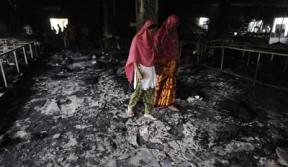On September 13, 2005, the San Francisco Board of Supervisors unanimously passed the San Francisco SweatFree Ordinance that requires city contractors to guarantee in writing that the uniforms, computers, and other goods they supply were not made by workers exploited in sweatshops. As part of the certification process, contractors who sign the sweatshop-free pledge would have to disclose the names of their subcontractors, where their factories are located, and what workers are paid.
By passing the ordinance San Francisco joins Los Angeles, Milwaukee, Newark, and Albuquerque, which already have anti-sweatshop laws on the books. (Madison passed one just after San Francisco). But San Francisco 's law is the most rigorous because it includes an initial $100,000 for enforcement and a stricter definition of what constitutes a sweatshop. Companies with one major violation of the code of conduct would be disqualified from future contracts with the city.
The law, introduced by Supervisor Tom Ammiano and Mayor Gavin Newsom, is scheduled to take effect in mid-December. During its first year, it will only apply to the garment industry, such as contractors who supply uniforms, sheets, and towels. An advisory committee will decide what category of contractors to target next.
This is the latest measure by which the San Francisco Board of Supervisors has aimed to use its $600 million in annual procurement to support products manufactured or grown in a humane and sustainable fashion. Earlier this year the Board of Supervisors also passed a Fair Trade Certified Purchasing Resolution and an Organic Certified Purchasing Resolution which instructed city officials to design ways of purchasing fair trade and organic products. The Fair Trade Resolution is also the strongest Fair Trade Resolution in the country, since it not only declares support for Fair Trade, but also assigns the Department of the Environment with the task of investigating purchasing practices and options and issuing recommendations by December, 2005 that identify how the city can maximize purchase of Fair Trade Certified products.
These resolutions link the nearly $1 billion dollar contract and procurement budget of the City of San Francisco to a set of principles that embody sustainability and social justice. As such these initiatives embody the principles of the Global Good Neighbor Ethic for International Relations, which outlines seven principles to shape America's relationship with the rest of the world. The recent laws passed by the San Francisco Board of Supervisors and supported by Mayor Newsom embody two of those principles:
PRINCIPLE 3
Given that our national interests, security, and social well-being are interconnected to those of other peoples, U.S. foreign policy must be based on reciprocity rather than domination, mutual well-being rather than cutthroat competition, and cooperation rather than confrontation.
PRINCIPLE 6
The U.S. government should support sustainable development, first at home and then abroad, through its macroeconomic trade, investment, and aid policies.
These resolutions, the products of extended campaigns by coalitions of citizens, labor and environmental groups, and private firms, clearly demonstrate that we have moved beyond the age when international relations were the exclusive domain of national governments. The global neighborhood we live in is shaped by flows of people, ideas, germs, trade, and investment. Although critical aspects of foreign policy are still the primary purview of national states, we are all active stakeholders. In this increasingly interconnected world, individuals, local governments, communities, churches, organizations, and corporations have a role to play in forging equitable and sustainable relationships among and between people. Good neighbor practices apply whether we operate a business, purchase goods, travel, or share the planet's resources.
The International Relations Center presents the San Francisco Board of Supervisors its second Global Good Neighbor Commendation Award.
For More Information
Fair Trade Certified Purchasing Resolution
http://www.sfgov.org/site/uploadedfiles/bdsupvrs/resolutions05/r0533-05.pdf
Organic Certified Purchasing Resolution
http://www.sfgov.org/site/uploadedfiles/bdsupvrs/resolutions05/r0532-05.pdf
SweatFree Ordinance
http://www.sfgov.org/site/uploadedfiles/bdsupvrs/ordinances05/o0223-05.pdf
Organic Trade Association
http://www.ota.com/pics/documents/The_Organic_Industry_Flyer.pdf
SweatFree Communities
http://www.sweatfree.org/about_us.shtml
Transfair on Passing Local Fair Trade Resolutions
http://www.transfairusa.org/content/support/Fair_trade-resolutions.php
